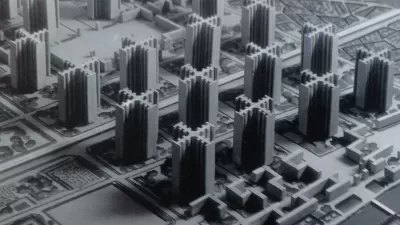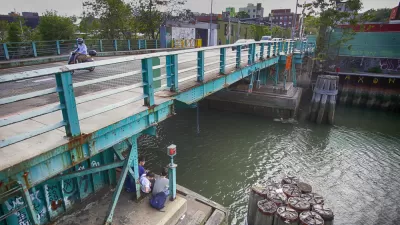I would like to think that the overwhelming response to the question posed in the title would be a resounding, "No!" I never gave the issue much thought before last week because frankly, I didn't really need to. Working in a city like Philadelphia where the overwhelming percentage of proposed projects requires a zoning variance, we've trained ourselves to work within an imperfect system and make the best of what's at hand. (It should be noted that Philadelphia is about to embark upon a process to re-vamp the zoning code, but that is for another post in the future). More importantly, the issues faced by some neighborhoods go a lot deeper than zoning. So why this post?
I would like to think that the overwhelming response to the question posed in the title would be a resounding, "No!" I never gave the issue much thought before last week because frankly, I didn't really need to. Working in a city like Philadelphia where the overwhelming percentage of proposed projects requires a zoning variance, we've trained ourselves to work within an imperfect system and make the best of what's at hand. (It should be noted that Philadelphia is about to embark upon a process to re-vamp the zoning code, but that is for another post in the future). More importantly, the issues faced by some neighborhoods go a lot deeper than zoning. So why this post?
I spent a day last week working in Philadelphia's Francisville neighborhood with a room full of New Urbanists who were in town for their annual Congress. We've been working on a neighborhood plan for Francisville for the past 8 months, so my role was to answer questions and play general tour guide when necessary. By and large, it was interesting to see the community through the eyes of outsiders. That said, I perceived an underlying tone that this neighborhood could somehow be "fixed" by zoning, or more specifically, a Smart Code. This is only a perception on my part and is based on the comments of a handful of people who said something specifically to this effect. One person actually told me that our plan would be meaningless if we didn't create a Smart Code for the community. This assumes that 1) Planning=Zoning; and 2) If we don't, or can't, change the existing zoning then we shouldn't even bother planning, which would effectively put this neighborhood in paralysis.
Outside of cities, I have no real issues with Smart Codes (or at least none I feel it's worth getting into here). But in cities, reality often conflicts with the ideal. Generally speaking, I agree with Smart Code ideals in that in the city, we should build for density and accommodate parking in the rear if possible. In theory, I also am not a big fan of zoning for use.
So where does reality interfere with the Smart Code? Well for one, telling people to build for density and mixed-use will not magically bring a market for new development, which, in Francisville, is only now beginning to resurface after decades of decline. This is not an issue specific to the Smart Code but one about planning for shrinkage versus growth. For now though, let's take a more specific example. A few CNU members told me that some of the local restaurants must be great for the neighborhood (generating activity and introducing a mix of uses and all). What they didn't see is that these establishments are often used for drug trafficking. With similar concerns in mind, the City of Rochester has down-zoned some of its commercial corridors to stop the development of check-cashing and other establishments that have negatively impacted surrounding neighborhoods. Zoning for use, it seems, has its merits.
I wish it didn't. It would be much easier to think of cities as physical gameboards that we try to manipulate formally. Taller here, less dense there, etc. Sounds like a process played out when planning resided in fewer, more powerful hands. As a designer, the idea of somehow shaping a city is still attractive, and a Smart Code certainly allows this illusion. Existing zoning codes, for that matter, also enable some degree of fantasy for city-shaping (depending on the code of course), assuming everyone plays by the rules. But there's the rub, there will never be a code (Smart or not) that will be implemented to the degree that its authors can sit back and watch the city grow according to their wishes. Reality always gets in the way and that is, I think, where our profession gets particularly interesting.

Alabama: Trump Terminates Settlements for Black Communities Harmed By Raw Sewage
Trump deemed the landmark civil rights agreement “illegal DEI and environmental justice policy.”

Study: Maui’s Plan to Convert Vacation Rentals to Long-Term Housing Could Cause Nearly $1 Billion Economic Loss
The plan would reduce visitor accommodation by 25% resulting in 1,900 jobs lost.

Planetizen Federal Action Tracker
A weekly monitor of how Trump’s orders and actions are impacting planners and planning in America.

Grand Rapids Mayor Proposes Garage Conversion Plan
The mayor says allowing homeowners to convert garages to dwelling units could alleviate the city’s housing shortage.

Baltimore Ordered to Improve Sidewalk Accessibility
The city is one of many to face lawsuits for failing to comply with the Americans with Disabilities Act.

This Toronto Suburb Has More Bus Riders Than Columbus, Ohio
Brampton, Ontario used gradual improvements in service to prove that if you build it, they will ride.
Urban Design for Planners 1: Software Tools
This six-course series explores essential urban design concepts using open source software and equips planners with the tools they need to participate fully in the urban design process.
Planning for Universal Design
Learn the tools for implementing Universal Design in planning regulations.
Smith Gee Studio
Alamo Area Metropolitan Planning Organization
City of Santa Clarita
Institute for Housing and Urban Development Studies (IHS)
City of Grandview
Harvard GSD Executive Education
Toledo-Lucas County Plan Commissions
Salt Lake City
NYU Wagner Graduate School of Public Service





























